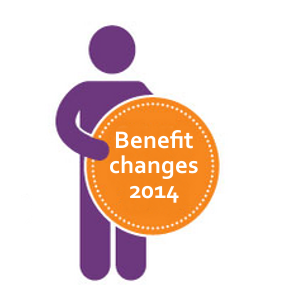There’s rarely a day goes by without benefit changes being in the news for some reason or other but it’s often hard to know the details of what’s actually going to happen. To make life easy, we’ve summarised the big welfare benefit changes in 2014.
These details are correct as of this article’s publication date but if you want to keep up with the latest changes we’d recommend signing up to the MoneyAware newsletter.
We’ll send you a monthly email full of lots of useful money-related stories, including the latest benefits news.
Child benefit changes in 2014
Child benefit has been frozen for the last three years but this April it will increase by one percent. This increases child benefit to £20.50 a week for your first child then £13.55 a week for each additional child. One percent isn’t exactly a massive increase but every little helps!
In a nutshell: Child benefit to go up by 1% in April.
Universal Credit changes in 2014
Universal Credit is a new benefit that’s been introduced to replace six existing benefits with a single monthly payment. The original plan to roll it out nationally in April 2014 has been scaled back and now it’ll be gradually phased in.
Here’s what’s happening:
-
Currently seven areas are operating the ‘pathfinder pilot’ and accepting simple Universal Credit applications (‘simple’ means single unemployed people with no children who are not living in a mortgaged property). These pilots are based in Ashton-under-Lyne, Wigan, Warrington, Hammersmith, Rugby and Inverness
-
In the spring of 2014 (exact date unconfirmed as of publication) Shotton, Bath and Harrogate will also start accepting claims for simple applications
-
After spring 2014 the 10 areas mentioned above will start accepting Universal Credit applications from couples without children.
-
Then in autumn 2014 those same 10 areas will begin to accept Universal Credit applications for couples with children too
-
After autumn 2014… after these 10 have fully introduced Universal Credit there will be plans put in place to begin a nationwide programme, starting in the north-west of England
In a nutshell: Universal Credit will remain in its pilot phase for most of year and will then potentially be expanded to more areas towards the end of 2014.
Personal tax allowance in 2014
Who doesn’t like paying less tax? From April 2014 the new tax allowance threshold will be set at £10,000. This means you’ll not pay income tax on the first £10,000 you earn, so most workers will notice a little rise in their take home pay after April.
In a nutshell: Income tax allowance to rise to £10k from April.
Pension age change in 2014?
It’s not yet law but there’s a Bill going through Parliament that could lead to the state pension age going up. The Government announced in the Autumn 2013 statement that they believe the pension age should be kept in line with life expectancy and that people should expect to spend a third of their adult life in retirement.
This means that based on the life expectancy today the qualifying age to receive your state pension would be 68 by 2030 and 69 in 2040, if the Bill were to be passed. The experts think that the bill is likely to pass but it’s possible that there could be some tweaks before it becomes law.
In a nutshell: There are plans going through Parliament that could see retirement age linked to average life expectancy, which is likely to lead to an increase in the state pension age.
Incapacity Benefit moving to Employment Support Allowance (ESA)
If you’re unable to work due to ill health then a few years ago you’d have probably been claiming Incapacity Benefit. It’s now been replaced by a new benefit called Employment Support Allowance.
Moving everyone over from Incapacity Benefit to ESA has been a long job but by next month it’s expected that everyone that had previously been receiving Incapacity Benefit will have been moved to ESA.
In a nutshell: Everyone will be moved over from Incapacity Benefit to ESA by March 2014.
Disability Living Allowance (DLA) moving to Personal Independence Payment (PIP)
The switch from Disability Living Allowance (DLA) to Personal Independence Payment (PIP) will continue this year. PIP replaced DLA for new claims last June and the work to move existing claims will take until October 2017 (based on the timescales available in January 2014).
So if you’re on DLA you’re likely to be moved over to PIP in the next few years. This will be done on a postcode by postcode basis and the Department for Work and Pensions timetable document can tell you more about the estimated timescales.
In a nutshell: all new claimants have to claim PIP, and existing DLA claimants will be moved over to PIP over the next few years.
Sign up to MoneyAware
Our email newsletter regularly features news on the latest changes to the benefits system, so it’s a good way to make sure you stay informed of what’s coming up. It’s also stuffed full of great money tips and budgeting ideas. Sign up to MoneyAware today!
If you think you might be entitled to benefits but aren’t sure then you should try our free online welfare benefits checker.
